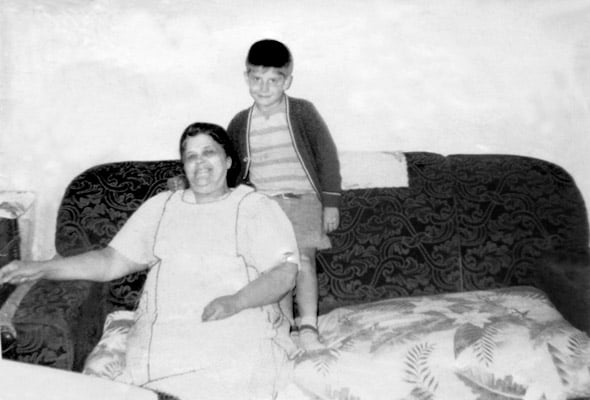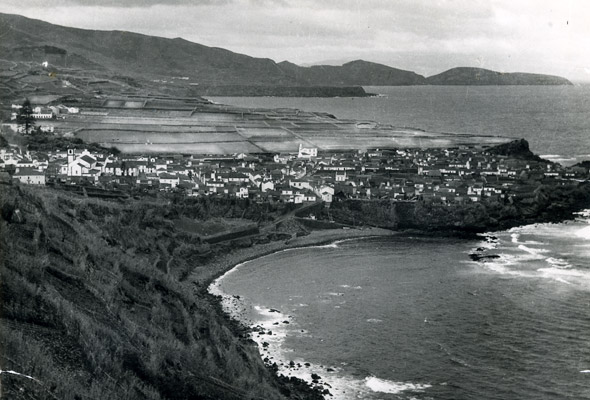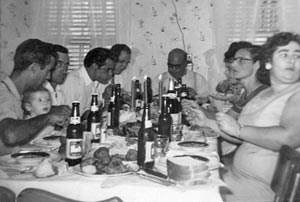

Clearly, something had to be done. So I approached my mother and aunts with a sheepish grin on my face and a video camera in my hand. My goal: to film family favorites being prepared before they too were lost. I wanted a permanent record of the food that filled three tables every Sunday when we laughed and talked (which to other families sounded like fighting), and my mother and aunts buzzed about happily shoveling their specialties onto our plates.

While they were eager to squeeze their way into the viewfinder, capturing their culinary heirlooms proved daunting. For example, there must have been a shortage of measuring cups and spoons in the Azores, because my mother and aunts cook only with pinches of this and handfuls of that. I had to yell “CUT!” more times than I care to recall to fish out a mound of parsley from boiling broth or catch a fistful of garlic midair in order to measure it properly.
Vocabulary proved another sticking point. While the National Live Stock and Meat Board categorizes beef into no fewer than 45 different cuts, it’s all just “meat” to my mother. Any further questioning was met with a shrug of her shoulders and — as if I were asking about sex — the admonition to discuss it with my father. In her intuitive, cookbook-free world, there were no fancy names or elaborate techniques. You simply rolled up your sleeves and began chopping.
But over time the recipes, as well as forgotten bits of family history, revealed themselves. I remembered summer days spent shucking fava beans with VoVo in her kitchen. And even though she sat there in just her slip plonking beans into a big white washtub at her feet, she looked like an empress. I joked with my mother about the ridiculous amount of food she makes every October for family and friends who help my father harvest his grapes for wine. Believe it or not, I even developed an appreciation, but certainly not a taste, for my Aunt Irene’s octopus stew.

I came to accept that our food defines us, whether we’re sitting at the kitchen table or not. Simply put, we are a family of immigrants — something I denied as a teenager by idolizing Big Macs and the Colonel’s original recipe. Anything to deep-six the Portuguese part of my Portuguese-American heritage.
Well, not any longer. My first visit to the Azores is scheduled for next fall. To prepare, I’m learning Portuguese, much to the hilarity of everyone. But most important, whenever I crave a taste of home, I just pop a cassette into the VCR and follow along with my mother and aunts — to me, the best collection of chefs on TV.












Hola David,
Your story is reminiscent of my own growing up in the States as one of several sons of Basque Mother from Spain and an Italian/French-American father from Massachusetts. My father was career military so we moved often. I must confess, the description you gave of your abuela(grandmother) VoVo along with your mother and aunts preparing dishes is identical to my own mother would make Basque and Spanish foods, many of which are identical or nearly identical to Portuguese dishes.
The Portuguese and Spaniards call themselves kissing cousins. They credit that to both having been part of the Roman Empire in the Region of Hispania, not to mention that the Portuguese, Gallego, Castilian and Catalan languages are all basically similar dialects coming originally from the Latin that was spoken previously in the Iberian Peninsula and her Islands.
Similar to you, as a kid growing up, I can remember being envious of my friends because they got to eat at McDonald’s or Burger King all the time. I had to eat Spanish, Basque and Italian cuisine, LMAO. Hey, when you’re a kids what do know? Absolutely Nothing!!!
After spending a year in Spain from 18 – 19 going to school, I had decided I would someday come back.
In any case, I also wanted to get back to my Spanish roots and explore Europe. When I was about 30 years old I went back to live in Spain for a couple of years. Ty Those few years ended up turning into 23 years.
Boy, did I get to know European Culture! That’s another story. I will say that while having spent so many years in the EU, I travelled quite a bit and noticed that a lot of the Southern Europeans’ ways of measuring ingredients in the homemade tradition is similar to yours and my family’s culinary traditions, that is by sight or feel. Apparently, people cooked by recalled pinches or handfuls etc from when they were being taught by their Nonas, VoVos, Abuelas, etc as you said was due to their illiteracy and that’s probably how they did it for many generations.
BTW, as you grew to appreciate your aunt’s octopus stew, I have also have grown to respect my mother’s Seafood Stew she made when I growing up.
I have yet to acquire a taste for it, but I can appreciate the work.
Ironically, my wife and kids love it.
Go figure.
Richard, it’s astounding that family experiences can be almost identical, even in different countries. Looking back, I wouldn’t have had it any other way. But, boy, did I want the Brady Buch life!
Olá, David.
If I understood you well, we should leave our comments in English for now… My (Tercirense) ex wife also cooked deliciously. Glad I’ve found your cantinho on the web. I’ll visit your other writings as, no doubt, they’ll be instructive and amusing.
Best regards,
João F.
Olá, John. Leaving the comments in English allows more folks to enjoy them. But feel free to write in Portuguese if you wish. I kinda, maybe understand Portuguese, but I do have Google translation nearby!